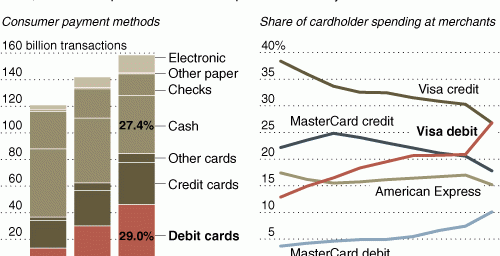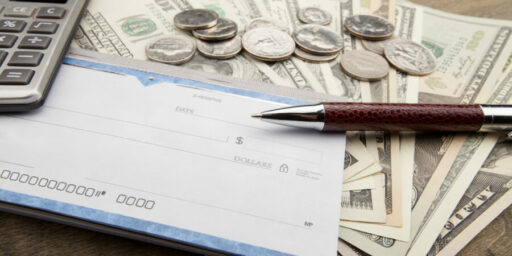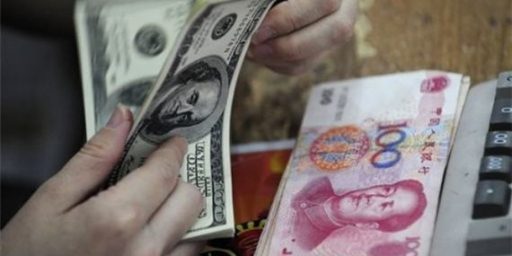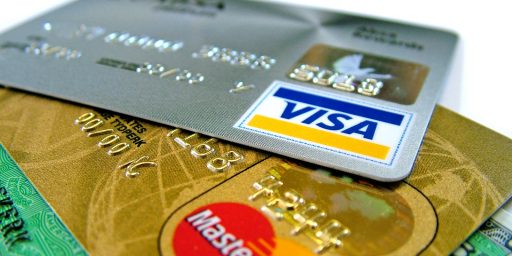Plastic Currency
Paper or Plastic? – Mexico and Australia have ditched paper money for plastic bills. Should we, too? (Eric Weiner, Slate)
Considering it’s the root of all evil, the sinew of love as well as war, money is surprisingly fragile. At least the paper variety is. The average $5 bill lasts only 16 months. Notes circulating in tropical climates wear even more quickly. I lived in India for several years and had more than one rupee bill literally disintegrate in my hands. This explains why Mexico and 22 other nations have switched from paper to plastic money for at least some denominations. Plastic bills last longer and are more difficult to counterfeit than paper bills. They are less likely to trip up ATMs, and they carry fewer germs. Plastic bills look and feel like “real” money, though they are a bit slicker to the touch.
The decision to switch from paper to plastic isn’t an easy one. Countries take their money seriously. They want their currencies to convey stability and power. Plastic implies cheapness and artifice, which is why all of the countries using plastic money prefer to call it by a more technical name: polymer money.
Mexico, for instance, is now issuing a 20-peso note ($1.79) made entirely out of polymer, or plastic. The plastic peso has gone over well. It looks a lot like the old, paper note it replaced. Here’s a photo. There’s still a portrait of former President Benito Juarez. There’s an added security feature, though: a clear plastic window, about the size of a postage stamp, that is extremely difficult to forge—and that’s one of the main reasons Mexico made the switch to plastic. Only plastic bills have this security window. Plastic currency has come a long way in a relatively short amount of time. Haiti and Costa Rica briefly experimented with a primitive version of plastic money in the early 1980s, but it was Australia that mastered the technology, issuing its first plastic bills in 1988 and converting entirely to plastic soon after. Each year, more and more countries are making the switch to plastic—most recently, Chile.
Plastic money has several advantages over paper. The plastic bills absorb less moisture and are therefore less likely to transmit germs, which is a danger, albeit a rare one, with paper notes. Plastic bills can endure a lot of abuse. You can twist them, bend them, and even put them through a wash/spin cycle without doing serious damage. They last four times longer than paper bills. Plastic bills are also less likely to clog ATMs and vending machines, since they don’t shed ink the way paper money does. Those tiny bits of ink—and dust—confuse the optical reading devices found in ATMs.
Interesting. It strikes me, though, that a better solution would be to simply switch to the “plastic” currency we have all become accustomed to: credit and debit cards. A purely electronic system would seem to have all of the advantages of polymer bills with none of the disadvantages.
There may be some advantage to regular currency for very small transactions but metallic coins could be used instead of paper bills for denominations of $1 and $5. For anything requiring the exchange of $10 or more, a debit/credit card of some sort could be used.






Doesn’t the government have a huge investment in the paper money float out there? If all of a sudden the paper money was turned in, would that hurt the US?
I really do not know the answers to this, but I vaguely remember that there is an amazing amount of money in bills all through out the world that the country uses as a float.
The primary advantage of polymer ‘paper’ currency is durability. When compare to the current fiber paper, it’s nearly indestructable.
I read somewhere that Singapore is on its way to a moneyless society — wherein every transaction will happen electronically. It’s an attempt to reduce costs and kill the black market economy, but it won’t happen here because for some reason Christians believe that getting rid of money is an indication of the end times.
Plastic stays dry when you get wet crossing a river… hint hint hint
Interesting. It strikes me, though, that a better solution would be to simply switch to the “plastic” currency we have all become accustomed to: credit and debit cards. A purely electronic system would seem to have all of the advantages of polymer bills with none of the disadvantages.
But folding money is untraceable. For anyone who doesn’t want their every transaction stored in a database, switching totally to plastic is not an option.
How many people don’t have bank accounts and deal exclusively in cash? That would make the debit card difficult since they’re tied to banks.
Bryan and Jen made the two best points. I’d like to see the smaller denominations of U.S. folding money replaced by coin, but doing away with cash entirely just isn’t practical, and I honestly can’t foresee a free future in which it would be.
for some reason Christians believe that getting rid of money is an indication of the end times.
Actually, Leopold, the “some reason” is tied in to having some sort of number (traditionally the 666 “mark of the beast”) affixed to every person, like a tattoo or a personal identification number. millenialists argue that getting rid of cash money would make it easier to plant the mark of the beast.
But I personally prefer my reason not to totally switch to a cashless society.
I just don’t see us switching over. I don’t think anyone wants to buy a package of gum with a debit card.
Churches and Twele-Step groups aren’t going to start taking debit cards when the collections are taken (and coins are already way too prevalent in those collections–I was treasurer at my self-help group, and the coins were a big, heavy pain in the butt).